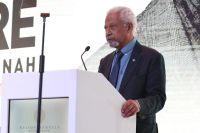
Abdulrazak Gurnah delivers the 22nd Nelson Mandela Annual Lecture.
(Image: Nelson Mandela Foundation)Through most of this year I have been thinking about the question of belonging.
As the Foundation has been building up its land reform programme, I’ve contemplated the extent to which the notion of land being owned by human beings is a product of Western modernism, and I’ve read widely in work which reveals how, in so many indigenous knowledge systems around the world, humans are instead regarded as belonging to the land.
In my last newsletter message I shared a reading of uMbuso weNkosi’s very powerful book, These Potatoes Look Like Humans: The Contested Future of Land, Home and Death in South Africa. This line of enquiry has connected powerfully for me with the work we’ve been doing on Palestine and with the novels of Abdulrazak Gurnah, which I’ve been reading in preparation for the 22nd Nelson Mandela Annual Lecture. It has been a special delight to host Abdulrazak and his life partner Denise for the best part of a week, through a number of events and multiple intimate conversations. The theme of belonging has loomed large through these encounters.
I’m left now with several threads inviting a certain personal tapestrying. One has to do with the clarity that the Earth belongs to no one, and the concomitant question of how human beings begin to learn how to belong to the Earth. A second one has to do the with the "nation state", which, more and more it seems to me, is being turned into a fortress against the tides of human migration. And then a quintessential South African question – with the clarity that the Freedom Charter gives us that South Africa belongs to all who live in it – how do we (all of us who live in it now, wherever we were born and wherever we come from) begin to learn how to belong to South Africa? And then there is this notion that home is where one belongs. But what if home is neither where one comes from nor where one is now, but rather where one is going to?
This will be my final message as Acting Chief Executive. The last eighteen months have been extraordinary in so many ways, and I’ve benefitted from support by so many. I am forever grateful for the solidarity, for the opportunity to do something special, and for the many deep learnings that have been made available to me. Not surprisingly, perhaps, after a 23-year journey with the Foundation, I find myself in this moment wrestling with what could be an archetypal question – where do I belong now? At one level the answer is simple – where I’m needed. A luta continua.